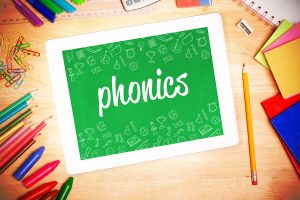![Web-Banners_Phonics-6_15_2016 [247055]](/wp-content/uploads/2016/08/Web-Banners_Phonics-6_15_2016-247055.png)

What is Phonics?
Phonics is the relationships between letters and sounds in a language. Phonics teaches both letters and sounds. Phonics is a reading method where children first learn the sounds (phonemes) that one or more letters make together when they are read aloud, and then begin to put those sounds together into words and then sentences. Learning to read with phonics can be very effective, especially if your child learns to read at an early age. Phonics instruction means students learn the relationships between letters of written language and the sounds of spoken language.
What is Phonemic Awareness?
 Phonemic awareness is the ability to hear, identify, and move individual sounds (phonemes) in spoken language. Phonemic awareness teaches only sounds. Phonemic awareness can be developed by having students blend sounds to form words, substitute sounds to make new words, and to identify and categorize sounds.
Phonemic awareness is the ability to hear, identify, and move individual sounds (phonemes) in spoken language. Phonemic awareness teaches only sounds. Phonemic awareness can be developed by having students blend sounds to form words, substitute sounds to make new words, and to identify and categorize sounds.
Why is Phonics Instruction Important?
Phonics instruction teaches children how to sound out new words. It has been proven that using phonics for kids is the best way for a child to learn to read. Phonics is widely regarded as being one of the most effective reading method for teaching children to read.
“Phonics instruction teaches children the relationships between the letters (graphemes) of written language and the individual sounds (phonemes) of spoken language. It teaches children to use these relationships to read and write words.” -- National Institute for Literacy (NIFL)
Learning to read using phonics is very important in the education of children. Phonics instruction helps to develop a strong solid foundation for a child’s reading skills. When a child is taught phonics in the right way, it makes reading easy for the child. Phonics is thought to provide many benefits to children who are just beginning to understand how sounds are associated with individual letters, groups of letters, and full words.
The following are some of the benefits of learning phonics:

- Learning phonics helps children learn how to spell words. The child will be able to recognize sounds in words and be able to spell them correctly when he or she is taught phonics.
- Learning phonics will help children to recognize and associate sounds of the letters of the alphabet in the words they read. This will help them to improve in their reading skills and ability.
- Learning phonics helps increase a child’s reading fluency.
- Learning phonics improves a child’s reading comprehension.
- Learning phonics will help a child’s vocabulary to grow. The child will have an extensive vocabulary. Vocabulary refers to the words we must know to communicate effectively.
- Learning Phonics helps children decode words independently. This allows children to learn new words on their own.
- Learning phonics leads children to whole-word recognition without having to sound out individual phonemes to decode each word.
- Learning phonics develops a child’s confidence. The child will realize that he or she has the ability to pronounce words or make the sound of (a word or part of a word), in the correct way.
- Learning phonics increases a child’s writing ability. As a child’s vocabulary grows through reading words, sentences, and stories, the child will have more to write about. Knowing phonics will help a child to know which letters to use as he or she writes words.He will always have something to write about.
- Learning phonics develops a child’s spelling skills more quickly. This happens because the child is learning which letters or combinations of letters to create sounds in words that they write by breaking down words into individual components.
- Learning phonics helps children develop strong thinking skills. Research shows that phonics-trained students demonstrated superior performance in the area of critical thinking over the long term.
The ability to read is necessary to survive and thrive in society today. Phonics reading will develop your child’s overall reading skills. The key to your child’s success in phonics is consistency!
